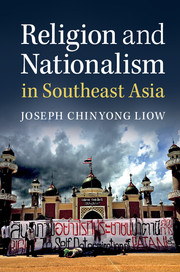Book contents
- Frontmatter
- Dedication
- Contents
- Preface
- Acknowledgments
- Glossary
- Introduction
- 1 Faith and Flag
- 2 Southern Philippines: Reframing Moro Nationalism from (Bangsa) Moro to Bangsamoro
- 3 Thailand's Southern Border Provinces: Constructing Narratives and Imagining Patani Darussalam
- 4 Malaysia: Religion, Ethno-Nationalism, and Turf-Guarding
- 5 Indonesia: Contesting Principles of Nationhood
- Conclusion
- Bibliography
- Index
4 - Malaysia: Religion, Ethno-Nationalism, and Turf-Guarding
Published online by Cambridge University Press: 05 August 2016
- Frontmatter
- Dedication
- Contents
- Preface
- Acknowledgments
- Glossary
- Introduction
- 1 Faith and Flag
- 2 Southern Philippines: Reframing Moro Nationalism from (Bangsa) Moro to Bangsamoro
- 3 Thailand's Southern Border Provinces: Constructing Narratives and Imagining Patani Darussalam
- 4 Malaysia: Religion, Ethno-Nationalism, and Turf-Guarding
- 5 Indonesia: Contesting Principles of Nationhood
- Conclusion
- Bibliography
- Index
Summary
Religious nationalism, as Chapter 1 pointed out, is premised on the idea that religiosity and patriotism can weave together in a manner that gives rise to a narrative which articulates a confessional perspective of nationhood. At its extreme, however, and in a climate where assertive religious claims dominate the narration of national identity and the institutions of the state, a heightened religious discourse potentially results in identity diffusion within the nation-state along religious lines, where confessional claims engender the creation of in-group and out-group identities. Malaysia provides a compelling case for how this process takes place.
In Malaysia, fault lines have formed over the issue of what it means to be a member of the Malaysian “nation” according to the official narrative of nationhood, and how this narrative has changed as erstwhile pluralist conceptions of national identity embraced by (and embracing) minority communities have been threatened, if not supplanted, by a religious discourse that seeks to rearticulate nationhood along narrow and exclusivist terms of a growing Malay-Islamic nationalism. If the previous cases of the Philippines and Thailand have demonstrated how religion offers a language and metaphor of resistance in the process of conceptualizing alternative nationhoods and national identities, in Malaysia it has taken the form of a hegemonic narrative of supremacy and exclusion dominated by religious vocabulary that is harnessed to reinforce, express, and institutionalize a narrowly interpreted narrative of Ketuanan Melayu – the dominance and lordship of the ethnic Malay-Muslims in multicultural Malaysia. Correspondingly, this has elicited responses from religious minorities who contest the legitimacy of this reframing of national identity and consciousness for reasons of the existential threat that they pose to their claims to be part of the “Malaysian nation.”
The rise of religious conservatism among Muslim actors who dominate the discourse of Malaysian politics touches on issues of both national identity construction as well as political legitimacy. This is so because of how social-political entrepreneurs operating both within and outside the state threaten by dint of explicit religious referents to erode any semblance of shared history, common sense of belonging, and “deep horizontal comradeship” upon which pluralist conceptions of nationhood stand.
- Type
- Chapter
- Information
- Religion and Nationalism in Southeast Asia , pp. 135 - 174Publisher: Cambridge University PressPrint publication year: 2016



